翻译篇第七章汉译英的常用技巧
英汉互译翻译技巧
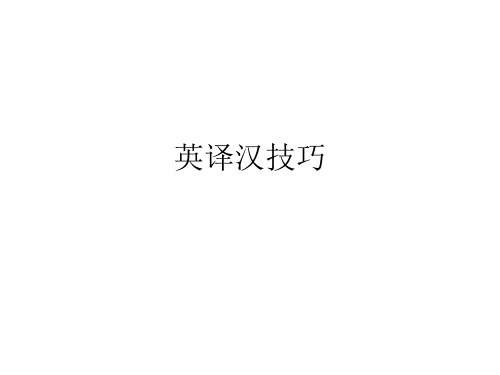
• They, not surprisingly, did not respond at all.
• 他们根本没有答复,这是不足为奇的。
• 短语的分译即将英语的某个短语单独拿出 来译成一个独立成份、从句或并列句。如:
• 例1:We tried in vain to persuade him to give up his wrong belief.
• He told me such experience as I had never heard of before.
• 他给我讲述了他的经历,那些经历是我以 前从未听说过的。
• He did not remember his father who died when he was three years old.
• The time was 10:30, and traffic on the street was light.
• 10点30分的时候,街上来往的车辆稀少了。
英汉翻译中常用的各种技巧
• 一、词类的转换 • 由于英汉两种语言在语法和习惯上存在差
异,在描述同一事物时,两种语言会使用 不同的词性。因此, 在翻译过程中, 有时 需要变换原词的词性,以有效的传达原文 的信息。常见的词类转换有一下几种。
5.英语副词→汉语名词
• It was officially announced that Paris is invited to the meeting.
• 官方宣布, 巴黎应邀出席会议。
二、词类的增减
• 1. 增词:
• 增词法按照汉语的习惯,在中文译文中适 当添加英语中所没有的词语,以便满足汉 语语法修辞的需要或更明确的表达原文的 含义。如:
汉译英的几种翻译技巧

汉译英的几种常用技巧(一)常用的翻译技巧1. 增译2. 减译(省译)3. 重复 4. 转译 5. 语序(词序/句序)调整(倒置) 6. 拆句与合并7. 正说反译, 反说正译8. 语态变换1.增译法:指根据英汉两种语言不同的思维方式、语言习惯和表达方式,在翻译时增添一些词、短句或句子,以便更准确地表达出原文所包含的意义。
这种方式多半用在汉译英里。
汉语无主句较多,而英语句子一般都要有主语,所以在翻译汉语无主句的时候,除了少数可用英语无主句、被动语态或“There be…”结构来翻译以外,一般都要根据语境补出主语,使句子完整。
英语中代词使用频率较高,凡说到人的器官和归某人所有的或与某人有关的事物时,必须在前面加上物主代词。
因此,在汉译英时需要增补物主代词,而在英译汉时又需要根据情况适当地删减。
英语词与词、词组与词组以及句子与句子的逻辑关系一般用连词来表示,而汉语则往往通过上下文和语序来表示这种关系。
因此,在汉译英时常常需要增补连词。
英语句子离不开介词和冠词。
另外,汉译英时还要注意增补一些原文中暗含而没有明言的词语和一些概括性、注释性的词语,以确保译文意思完整。
总之,通过增译,一是保证译文语法结构的完整,二是保证译文意思的明确。
1. I am looking forward to the holidays. 我们等待假日的到2.Much of our morality is customary. 我们大部分的道德观念都有习惯性。
3.Reading makes a full man; conference a ready man; and writing an exact man.读书使人充实,讨论使人机智,笔记使人精确。
4.Histories make men wise; poets witty; the mathematics subtle; natural philosophy deep; moral grave; logic and rhetoric able to contend. 读史使人明智,读诗使人灵秀,数学使人周密,科学使人深刻,伦理使人庄重,逻辑修辞之学使人善辩。
_汉译英翻译常用技巧
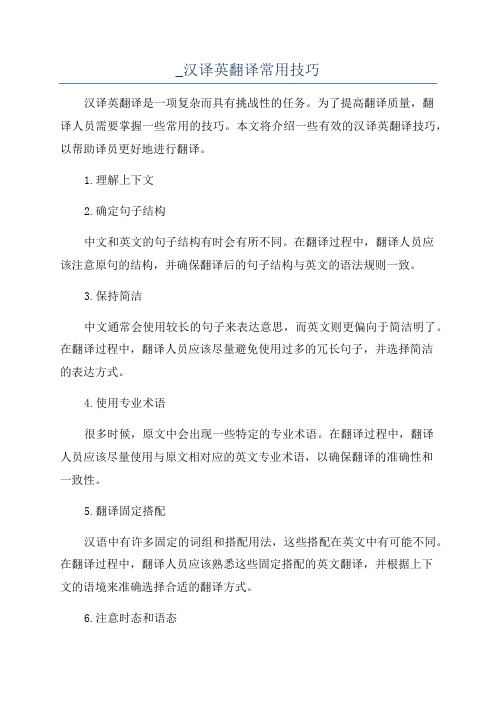
_汉译英翻译常用技巧汉译英翻译是一项复杂而具有挑战性的任务。
为了提高翻译质量,翻译人员需要掌握一些常用的技巧。
本文将介绍一些有效的汉译英翻译技巧,以帮助译员更好地进行翻译。
1.理解上下文2.确定句子结构中文和英文的句子结构有时会有所不同。
在翻译过程中,翻译人员应该注意原句的结构,并确保翻译后的句子结构与英文的语法规则一致。
3.保持简洁中文通常会使用较长的句子来表达意思,而英文则更偏向于简洁明了。
在翻译过程中,翻译人员应该尽量避免使用过多的冗长句子,并选择简洁的表达方式。
4.使用专业术语很多时候,原文中会出现一些特定的专业术语。
在翻译过程中,翻译人员应该尽量使用与原文相对应的英文专业术语,以确保翻译的准确性和一致性。
5.翻译固定搭配汉语中有许多固定的词组和搭配用法,这些搭配在英文中有可能不同。
在翻译过程中,翻译人员应该熟悉这些固定搭配的英文翻译,并根据上下文的语境来准确选择合适的翻译方式。
6.注意时态和语态中文和英文的时态和语态使用规则有所不同。
在翻译过程中,翻译人员应该根据原文的语境和动词的时态来选择合适的英文表达方式。
7.注意代词的使用中文中的代词使用频率较高,而英文中的代词使用较少。
在翻译过程中,翻译人员应该根据上下文的语境来确定是否需要使用代词,并选择合适的英文代词。
8.注意修饰语的位置中文中的修饰语通常紧跟在名词之后,而英文中的修饰语通常放在名词之前。
在翻译过程中,翻译人员应该注意修饰语的位置,并正确翻译。
9.注意词汇和词义的转换在翻译过程中,翻译人员应该根据上下文的语境,准确地选择合适的英文词汇和词义,并将其转换成英文表达方式。
10.注意语气的表达中文和英文的语气表达方式有所不同。
在翻译过程中,翻译人员应该注意原文中的语气,并选择合适的英文表达方式,以保持原文的语气和风格。
总之,汉译英翻译是一项需要技巧和经验的任务。
翻译人员应该不断学习和提升自己的翻译技巧,以保证翻译的准确性和流畅性。
汉译英常用技巧

几种常见的技巧 1.增译法:指根据英汉两种语言不同的思维
方式、语言习惯和表达方式,在翻译时添 加一些词、短语或句子,以便更准确地表 达出原文所包含的意义。
2.省译法:与增译法相对应的一种翻译方法,
即删去不符合目标语思维习惯、语言习惯 和表达方式的词,以避免译文累赘。
3.转换法:指翻译过程中为了使译文符合目
2.我邀请了我的好友,请他们来帮忙把宴会 弄得热闹些,增加点欢快气氛,没去理会 他们多数人在情感上都有些疲惫这一事实。 I called on my faithful friends to help make it a merry and festive occasion,ignoring the fact that most of them were emotionally drained and exhausted. 此句中用to do 不定式和伴随状语将短句连 成了长句。
合并法
•
合并法是把若干个短句合并成一个长句。 汉语强调意合,结构较松散,因此简单句 较多;英语强调形合,结构较严密,因此 长句较多。所以,汉译英时要根据需要注 意利用连词、分词、介词、不定式、定语 从句、独立结构等把汉语短句连成英语长 句。
课文中的例句
1.他们一道吃早饭,平时每天早上一道开车 去海军航运中心,他们都在那里工作,吉 米在那里搬卸标有彩色代号的箱子。 • They ate breakfast together and on weekdays drove off to the navy shipping center every morningwhere they both worked--Jimmy unloaded color-coded boxes. • 此句中用连词and和where引导的定语从句 等将短句连成了长句。
汉译英翻译的技巧
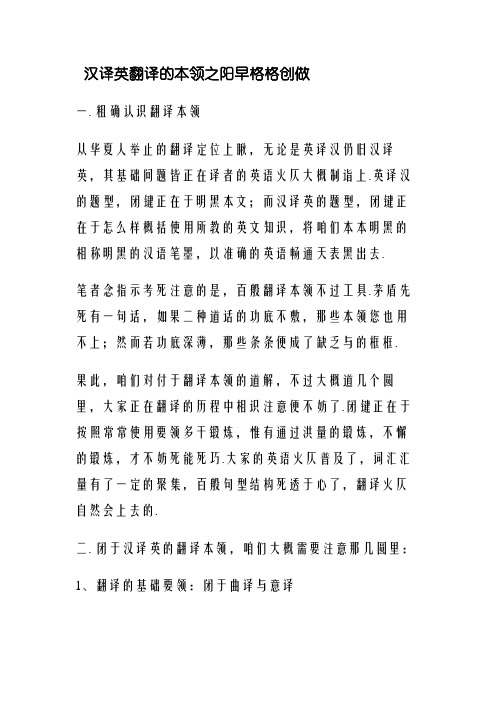
汉译英翻译的本领之阳早格格创做一. 粗确认识翻译本领从华夏人举止的翻译定位上瞅,无论是英译汉仍旧汉译英,其基础问题皆正在译者的英语火仄大概制诣上.英译汉的题型,闭键正在于明黑本文;而汉译英的题型,闭键正在于怎么样概括使用所教的英文知识,将咱们本本明黑的相称明黑的汉语笔墨,以准确的英语畅通天表黑出去.笔者念指示考死注意的是,百般翻译本领不过工具.茅盾先死有一句话,如果二种道话的功底不敷,那些本领您也用不上;然而若功底深薄,那些条条便成了缺乏与的框框.果此,咱们对付于翻译本领的道解,不过大概道几个圆里,大家正在翻译的历程中相识注意便不妨了.闭键正在于按照常常使用要领多干锻炼,惟有通过洪量的锻炼,不懈的锻炼,才不妨死能死巧.大家的英语火仄普及了,词汇汇量有了一定的聚集,百般句型结构死透于心了,翻译火仄自然会上去的.二. 闭于汉译英的翻译本领,咱们大概需要注意那几圆里:1、翻译的基础要领:闭于曲译与意译英语战汉语是二种分歧的道话 ,每种道话皆有各自独力战明隐的系统 ,正在形态战句法圆里二者存留很大好别.然而 ,二种道话之间又存留一些相似性.比圆正在主谓词汇序战动宾词汇序上是普遍的.正是由于英汉二种道话既有共共面又有分歧面 ,所以正在翻译试验中 ,咱们不克不迭千篇一律天使用一种要领举止翻译.曲译战意译是二种要害的翻译要领.曲译是既脆持本文真量、又脆持本文形式的翻译要领大概翻译笔墨.意译,也称为自由翻译 ,它是只脆持本文真量、不脆持本文形式的翻译要领大概翻译笔墨.曲译与意译相互闭联、互为补充,共时,它们又互相协做、互相渗透,不可分隔.通过对付曲译与意译二者闭系的粗确明黑,咱们不妨更多天认识到什么时间采与曲译、什么时间采与意译,以及正在使用曲译与意译的时间所该当掌握的本领、按照的准则战该当注意的问题,最后达到普及翻译本领及火仄的脚法.考死那里应当注意,曲译不是死译,而是指基础死存本有句子结构,照字里意义翻译.比圆:咱们的伙伴遍天下.如果译成“Our friends are all over the world”是曲译,而“We have friends all over the world”便是意译.曲译以庄重意义上的忠真为目标,意译则更多思量英语的特性.总之,采用曲译仍旧意译,该当根据文章简曲需要而定,二种译法不妨并用.2、翻译的变通脚法翻译时不克不迭简朴天大概板滞天逐字照译,硬凑成英文,必须宽肃分解上下文,掌握词汇的确切含意,而后用适合的英文表黑,需要时应采与变通脚法.1)删词汇、减词汇译文的删词汇、减词汇皆是为了更确切、更忠真天表黑本文的含意战粗神.译文中增加一些本文不的词汇句,表面上瞅似不忠真,然而小心分解便会创制那些减少的词汇句所表黑的意义并不是无中死有,而是隐含正在本文中的.减词汇则是正在不做用本意的情况下简略无闭紧急的词汇语,预防拖泥戴火.如“感冒不妨通过人的脚感染”不妨译为Flu can be spread by hand contact.其中的contact(交战)便是根据译文需要增加上的.而“百姓出现干饭面火易局里”中的“局里”一词汇不妨简略,只译成“people do not even have matches to light their stoves.”便脚以表黑本文中的疑息.咱们分别去瞅几个例句:例1 尔不感触用英语与中国人接道有什么艰易.I don’t think it difficult to speak to a foreigner in English.(删形式主词汇it)例2 真心使人先进,骄傲使人降后.Modesty helps one to go forward, whereas conceit makes one lag behind.(删连词汇)例3 他连绝道了二小时的法语,不出现所有的过失.He has been speaking in French for two hours without any mistakes.(省动词汇)例4 人群徐徐静了下去.Silence came over the crowds.(省副词汇)翻译的变通脚法2)词汇类变换词汇类变形战变换,是英语道话的一个很要害的特性,特天是名词汇、动词汇、形容词汇那三种最主要的词汇类,大部分不妨间接变换使用,大概者稍加变更(前缀、后缀等)即可变换为另一种词汇类.果此,词汇类变换是汉英翻译中很要害的脚法之一.如果使用恰当,既可使译文畅通流畅,也能反映出英语的风格特性.底下将英汉互译中最罕睹的词汇类变换局里,做一个简朴的介绍.A. 汉语中的动词汇变换成英语中的名词汇汉语中动词汇用的较多,除了动宾结构中,另有连动式、兼语式等二个动词汇以上连用的局里.英语则可则,一句话往往惟有一个谓语动词汇,然而英语中的名词汇比汉语中的名词汇用的多.鉴于二种道话的那一特性,正在汉译英常常把汉语中的动词汇变换为英语中的名词汇.比圆:您必须佳佳天照应病人.You must take good care of the patient.他擅于瞅察.He is a good observer.正在上述二句中,"照应","瞅察"皆是动词汇,然而译成英语,则用的是名词汇care战 observer.反之,正在翻译历程中,偶尔也要把汉语中的名词汇变换成英语的动词汇.比圆:他的报告给咱们的影像很深.His speech impressed us deeply.汉语句子中“影像”是名词汇,英语句子中则换成了动词汇.B. 汉语中的动词汇变换为英语的形容词汇汉语中一些表示知觉、情感的动词汇,往往不妨转译成英语系动词汇+形容词汇的结构,比圆:尔为他的健壮担忧.I am worried about his health.咱们对付她所干的十足感触谦意.We are satisfied with what she did.C. 汉语中的形容词汇转移为英语中的名词汇,反之亦然.您道他愚不愚?Don't you think he is an idiot?他的死日宴会很乐成.His birthday party was a great success.形容词汇“愚”换成了英语名词汇 an idiot;“乐成”换成了英语名词汇success.D. 其余变换除了最罕睹的名词汇、动词汇、形容词汇之间的变换,其余的词汇类根据需要也不妨互相变换.不过要注意:那已不完尽是词汇类变换的本领,而是汉英思维战表黑办法的分歧了.比圆:露西战莉莉上共一个书籍院.Lucy and Lily are in the same school.尔阻挡付那项执法.I am against the law.“上教”正在汉语里是动词汇,而英语不妨用介词汇in 表黑;“阻挡付”也是动词汇,英语用介词汇against 表示.Robinhood often looted the rich and helped the poor.罗宾汉常常劫富济贫.英语形容词汇rich, poor 换成了汉语的名词汇“富、贫”.She is physically weak but mentally sound.她体量好然而头脑健康.英语副词汇physically 变换成了汉语的名词汇“体量”.翻译的变通脚法3)语态变换由于正在英汉二种道话核心皆有主动战主动二种语态,正在汉译英时,人们常常会简朴天认为只消依照本句的语态处理便止了.究竟上并不是如许.正在英语中主动语态的使用频次要近近下于汉语.如果一味依照本句的语态去翻译,往往会使译文隐得格中别扭.所以咱们正在汉译英时需要机动使用语态之间的变换.咱们那里主要道三种情况:汉语主动句的形成大概可分为二类:一类戴有明隐的主动标记表记标帜词汇(便是“被”“让”那些);另一类则不那种标记表记标帜词汇.人们常常使用后一典型的主动句.然而不管哪一种典型,翻译成英语时基础上仍可使用主动语态.A. 用“被、通过、让、给、遭、由、受、为……所”等标记表记标帜词汇表示主动语态的汉语主动句.那类句子普遍表示较强的主动意义,强调主动的动做.例1 那本书籍已经被译成多种道话.译文:The book has already been translated into many languages.简评:本文强调的是“那本书籍”已经被翻译成多种道话,本去不强调是“谁”翻译了那本书籍,不强调“翻译”那个动做的施动者.果此,英语译文采与主动语态真足切合本文表黑内涵.例2 那个小男孩正在搁教回家的路上受了伤.译文:The little boy was hurt on his way home from school.简评:小男孩受了伤,那是齐句要表黑的核心意义.然而是他为什么会受伤?被人挨?被车碰?被石头绊?被同物砸?句子不接代.普遍情况下出人会自己伤害自己,果此正在“受伤”那面上,男孩是动做的目标.华文采与“受”标明主动,英语也用主动语态去翻译,脚法是叙述小男孩受伤那个究竟.戴有上述主动标记表记标帜的句子不妨译成英语的主动句.然而是,也本去不是所有戴有主动标记表记标帜的句子皆要那样处理,要简曲情况简曲对付待.B. 主动标记表记标帜词汇不明隐的汉语主动句.那类句子普遍皆有主语战谓语动词汇,然而其主语本量上是动做启受者,本去不是动做真止者.真真的动做真止者并不出现.那样的句子形式上是主动句,含意上却是主动的.究竟上,那种主动句正在凡是死计中使用频次更下,正在译成英文时往往要采与主动语态.请瞅下列句子:例3 门锁佳了.译文:The door has been locked up.简评:句子的主语是“门”,动做是“锁”.然而是寡所周知,一个非死命体“门”怎么样真施一个动做“锁”?很隐然,“门”也许是妈妈锁上的.那句话不一个表示主动语态的主动标记表记标帜词汇,然而却是一个典范的主动语态句.果此,翻译成英文时不克不迭道成The door has locked itself.例4 那个问题早办理了.译文:This problem has long been solved .简评:华文常道“问题有待办理”,那战本句结构相共,皆是“办理”那个动做的目标——“问题”做所有句子的主语.然而表示主动语态.英语里也只可道sb. solves the problem大概the problem is solved.C. 除此除中,汉语还存留一种“怪局里”,即:用主动语态去表黑主动意义.比圆“正在……中”嵌进及物动词汇可用于表示主动意义.那种情况正在译成英语时,普遍也采用主动语态去翻译.例5 新住房正在修制中.译文:New houses are being built.例6 新课本正在印刷中.译文:New textbooks are being printed.翻译的变通脚法4)分译与合译句子的分译与合译是较为搀纯的课题,也是翻译中常需要办理的问题.常常情况下,少句要分译,短句要合译,然而不可一致而论.决断分译与合译的要害果素还与决于句中的各个身分之间意义上的闭联,以及该句与上下文之间含意的连贯,共时还要切合英语的表黑习惯.需要分译的句子,普遍是少句,大概者是结构搀纯的复句.那种句子如果翻译成一个少句,便会使译文乏赘、冗少;如果采与分译,便会使本文真量条理明隐,译文易于明黑.比圆:餐馆里惟有几部分,大概许是果为天气热的去由吧!There were only a few people in the restaurant. Probably because of the cold weather!由于咱们考查中普遍太少的句子也不罕睹,故已几举例.B. 句子的合译纵然英语句子日趋简净,然而从句套从句,短语含短语也频频出现,较汉语而止少句多,所以正在翻译中,便要把汉语的二个大概多个句子合译为英语的一句.比圆:对付尔去道,尔的小房间便像尔自己的一个小王国.尔便是内里的国王.To me my small room is like my own little kingdom, where I am king.。
英汉互译方法与技巧

英汉互译方法与技巧
x
英汉互译方法与技巧
一、分析互译句子的结构
互译是一项复杂的语言学习技能,有效的互译需要对句子的结构进行精确的分析。
要完成一个地道的互译,首先要将英文句子精确地分解,看清其句子结构。
在分解过程中,可以先将英文句子的核心成分,尤其是句子的谓语部分抽出来,将其分离出来,然后在依次拆解其他的句子结构,以便正确地表达英文句子的意义。
二、运用汉语的表达方式
汉语和英语在表达方式上有着很大的差异,在互译过程中,应该根据汉语的表达习惯,运用汉语的表达形式,注意避免英语的表达方式,以达到表达意义正确的目的。
三、使用前后对应的技巧
在互译过程中要有前后对应的能力,尤其在译出同一句子的时候,要能够根据句子的前半部分,找出英文句子的意思,然后再根据英文句子的后半部分入手,让汉语句子和英语句子的结构能够一一对应,以便表达意义准确无误。
四、加强重点语法的学习
要做到准确的互译,就必须掌握英语的语法知识,尤其是一些比较容易混淆的重点语法,要加强学习,以便在互译过程中让自己更加熟练。
汉译英翻译技巧-长句的翻译_大学英语
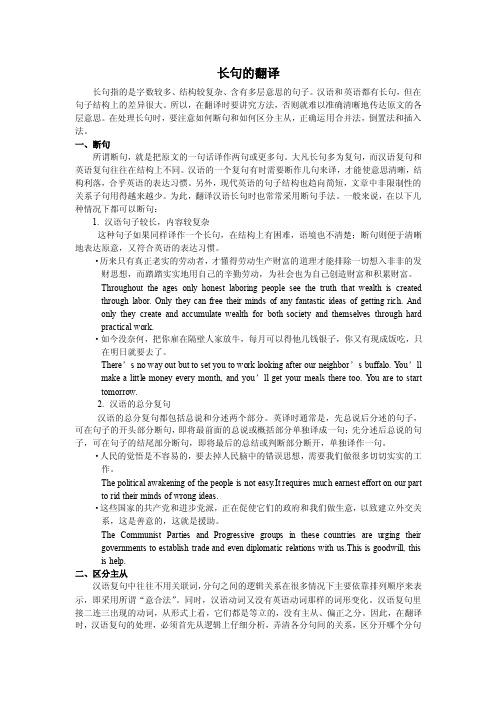
长句的翻译长句指的是字数较多、结构较复杂、含有多层意思的句子。
汉语和英语都有长句,但在句子结构上的差异很大。
所以,在翻译时要讲究方法,否则就难以准确清晰地传达原文的各层意思。
在处理长句时,要注意如何断句和如何区分主从,正确运用合并法,倒置法和插入法。
一、断句所谓断句,就是把原文的一句话译作两句或更多句。
大凡长句多为复句,而汉语复句和英语复句往往在结构上不同。
汉语的一个复句有时需要断作几句来译,才能使意思清晰,结构利落,合乎英语的表达习惯。
另外,现代英语的句子结构也趋向简短,文章中非限制性的关系子句用得越来越少。
为此,翻译汉语长句时也常常采用断句手法。
一般来说,在以下几种情况下都可以断句:1. 汉语句子较长,内容较复杂这种句子如果同样译作一个长句,在结构上有困难,语境也不清楚;断句则便于清晰地表达原意,又符合英语的表达习惯。
·历来只有真正老实的劳动者,才懂得劳动生产财富的道理才能排除一切想入非非的发财思想,而踏踏实实地用自己的辛勤劳动,为社会也为自己创造财富和积累财富。
Throughout the ages only honest laboring people see the truth that wealth is created through labor. Only they can free their minds of any fantastic ideas of getting rich. And only they create and accumulate wealth for both society and themselves through hard practical work.·如今没奈何,把你雇在隔壁人家放牛,每月可以得他几钱银子,你又有现成饭吃,只在明日就要去了。
There’s no way out but to set you to work looking after our neighbor’s buffalo. Y ou’ll make a little money every month, and you’ll get your meals there too. Y ou are to start tomorrow.2. 汉语的总分复句汉语的总分复句都包括总说和分述两个部分。
中译英翻译技巧

一、戒“从一而终”汉语言简意赅,句子灵活,往往是一个汉语词汇对应N 个英语词汇,具体到在本句中应该采用哪个意项,应该采用哪个意项,务必抓住精神实质,务必抓住精神实质,务必抓住精神实质,不可以不变应万变。
不可以不变应万变。
不可以不变应万变。
至于怎么应变,这就是显至于怎么应变,这就是显示译者功力的地方了。
比如:都是“问题”,下面的翻译各不相同,几乎是打一枪换一个地方。
共同关心的问题questions of common interest解决问题solve a problem问题的关键the heart of the matter关键问题 a key problem原则问题 a question/matter of principle没有什么问题without any mishap摩托车有点问题Something is wrong with the motorcycle.问题不在这里That is not the point.译者要掌握这种汉英翻译中的“游击战术”,翻译家应是不同“文化王国”边境线上的“游击战略家”。
沙博里将《水浒传》译为:Outlaws of the Marsh(沼泽地上的亡命之徒沼泽地上的亡命之徒),杨宪益译将屈原的《国殇》译为:For Those Fallen forTheir Country ,北外出版社将《儒林外史》译为:The Scholars 。
这些都是译者吃透了原文的原意而译出的佳作。
二、戒望文生义,机械直译这多半是初学者犯的毛病,他们易于被表面现象所迷惑。
黄牛(yellow cow ————ox ox 前误后正,下同) 黄鹂bird (yellow bird ——————oriole) oriole)黄瓜( yellow melon ————cucumber) cucumber) 紫菜vegetable (purple vegetable ——————laver) laver)红木(red wood ————padauk) padauk) 红豆杉(red fir ————Chinese Chinese yew)黑社会(black society ————sinister sinister gang)三、戒“水土不符”,习惯搭配失当这的确是难度系数较大的问题,它要求译者既有较高的中文修养,又要有较高的英文造。
汉译英基本技巧
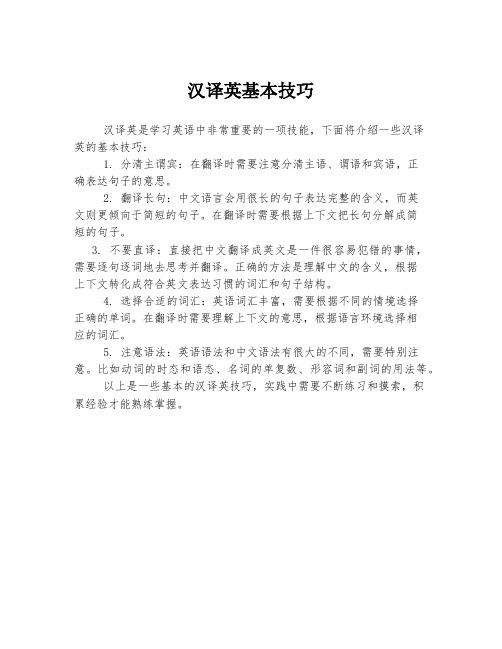
汉译英基本技巧
汉译英是学习英语中非常重要的一项技能,下面将介绍一些汉译
英的基本技巧:
1. 分清主谓宾:在翻译时需要注意分清主语、谓语和宾语,正
确表达句子的意思。
2. 翻译长句:中文语言会用很长的句子表达完整的含义,而英
文则更倾向于简短的句子。
在翻译时需要根据上下文把长句分解成简
短的句子。
3. 不要直译:直接把中文翻译成英文是一件很容易犯错的事情,需要逐句逐词地去思考并翻译。
正确的方法是理解中文的含义,根据
上下文转化成符合英文表达习惯的词汇和句子结构。
4. 选择合适的词汇:英语词汇丰富,需要根据不同的情境选择
正确的单词。
在翻译时需要理解上下文的意思,根据语言环境选择相
应的词汇。
5. 注意语法:英语语法和中文语法有很大的不同,需要特别注意。
比如动词的时态和语态、名词的单复数、形容词和副词的用法等。
以上是一些基本的汉译英技巧,实践中需要不断练习和摸索,积
累经验才能熟练掌握。
汉译英翻译常用技巧

汉译英翻译常用技巧汉译英是语言转换的过程,需要结合语言特点和句子结构来进行翻译。
下面是汉译英翻译常用技巧的一些要点:1.注意词语的使用在翻译过程中,应注意选择适当的词语,避免使用生硬的直译。
可以根据句子的具体语境来选择合适的词语,充分考虑词义、语体、文化背景等因素。
2.理解词语的多义性汉语中的词语通常有多个义项,需要根据上下文确定正确的翻译。
在翻译过程中,要注意词语的多义性,避免产生歧义。
3.注意语法结构中英语法结构有很大差异,所以在翻译过程中要注意语法结构的转换。
例如,英语中主谓宾的语序与汉语有所不同,需要注意将句子结构调整为符合英语语法的形式。
4.注意动词的时态英语中的动词时态较为复杂,需要根据上下文确定正确的时态。
在翻译过程中,要注意将动词的时态正确地转换为英语的对应形式。
5.注意做动词的“的”和“得”在汉语中,“的”和“得”在做动词时的用法相似,但在英语中它们有不同的翻译。
一般情况下,“的”翻译为“的”或“的”;“得”翻译为“to”或“must”。
6.使用适当的连词在汉译英翻译中,使用适当的连词能够使句子更加流畅。
常用的连词有“but”、“and”、“or”等。
根据句子的逻辑关系和语境,选择合适的连词来进行翻译。
7.注意上下文的衔接在翻译过程中,要注意将上下文的信息进行衔接,以确保翻译准确传达原文的意思。
在处理复杂句子时,要注意将上下文中的重要信息和语法结构准确地表达出来。
8.考虑文化差异汉英翻译中需要考虑不同文化背景对表达方式的影响。
在翻译过程中,要注意在尊重原文的同时,将信息准确传达给目标读者。
9.使用合适的术语和行业词汇根据具体领域的需求,要选择合适的术语和行业词汇。
在翻译过程中,要了解所涉及领域的专业术语,确保翻译的准确性和专业性。
10.多加练习翻译是一项技能,需要通过不断的练习来提高。
多进行汉译英的练习,积累翻译经验,提高翻译的准确性和流利度。
总之,汉译英的翻译技巧是一个不断学习和掌握的过程,通过不断的练习和积累,可以提高翻译的准确性和质量。
英汉互译的方法和技巧
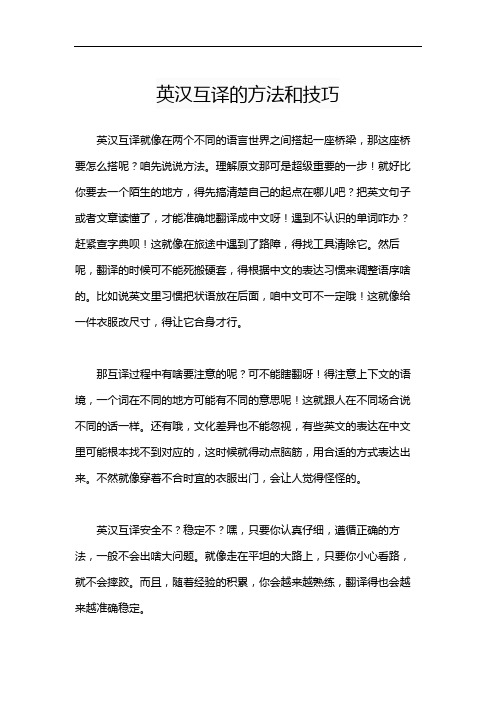
英汉互译的方法和技巧英汉互译就像在两个不同的语言世界之间搭起一座桥梁,那这座桥要怎么搭呢?咱先说说方法。
理解原文那可是超级重要的一步!就好比你要去一个陌生的地方,得先搞清楚自己的起点在哪儿吧?把英文句子或者文章读懂了,才能准确地翻译成中文呀!遇到不认识的单词咋办?赶紧查字典呗!这就像在旅途中遇到了路障,得找工具清除它。
然后呢,翻译的时候可不能死搬硬套,得根据中文的表达习惯来调整语序啥的。
比如说英文里习惯把状语放在后面,咱中文可不一定哦!这就像给一件衣服改尺寸,得让它合身才行。
那互译过程中有啥要注意的呢?可不能瞎翻呀!得注意上下文的语境,一个词在不同的地方可能有不同的意思呢!这就跟人在不同场合说不同的话一样。
还有哦,文化差异也不能忽视,有些英文的表达在中文里可能根本找不到对应的,这时候就得动点脑筋,用合适的方式表达出来。
不然就像穿着不合时宜的衣服出门,会让人觉得怪怪的。
英汉互译安全不?稳定不?嘿,只要你认真仔细,遵循正确的方法,一般不会出啥大问题。
就像走在平坦的大路上,只要你小心看路,就不会摔跤。
而且,随着经验的积累,你会越来越熟练,翻译得也会越来越准确稳定。
英汉互译都用在啥场景呢?那可多了去了!比如你看英文电影,没有中文字幕,这时候就得靠翻译来理解剧情啦!还有学习英语的时候,翻译可以帮助你更好地理解课文。
出去旅游,遇到外国人,翻译能让你和他们交流无阻。
这多棒呀!英汉互译的优势也很明显呢!可以让你开阔视野,了解不同的文化。
就像给自己打开了一扇通往新世界的大门,多让人兴奋呀!给你举个实际案例哈。
有一次我看一本英文小说,里面有个句子“Love is a journey, not a destination.”刚开始我直接翻译成“爱是一个旅程,不是一个目的地。
”总觉得有点别扭。
后来我调整了一下语序,翻译成“爱,是一场旅程,而非终点。
”是不是感觉好多了?这就是英汉互译的实际应用效果呀!英汉互译就是这么神奇,能让我们在不同的语言世界里自由穿梭。
汉译英技巧

汉译英技巧
1. 理解上下文
在翻译前,仔细阅读并理解原文的上下文和语境,这有助于准确把握原文的含义,避免产生歧义。
2. 注意语序
汉语和英语的语序有所不同,在翻译时要注意调整语序,使译文符合英语的表达习惯。
3. 掌握固定搭配
英语中存在大量的固定搭配和习惯用语,翻译时要熟练掌握这些表达方式,避免生硬的直译。
4. 注意词性转换
由于两种语言的结构差异,有时需要在翻译时改变词性,如将汉语的动词翻译成英语的名词等。
5. 运用同义替换
当遇到难以直译的词语时,可考虑使用同义词或同义短语来替换,以更好地表达原意。
6. 注重语言风格
翻译时要注重保持原文的语言风格,如是否正式、口语化等,使译文与原文风格相符。
7. 查阅工具书
遇到生词或不熟悉的词语时,及时查阅词典、专业术语手册等工具书,以确保翻译的准确性。
8. 反复修改
翻译完成后,要反复审阅和修改,确保译文通顺、准确,没有语病和错误。
英语翻译技巧(英译汉,汉译英)

英语翻译技巧(英译汉,汉译英)英语翻译技巧英译汉:⼀、词义的选择和引伸技巧英汉两种语⾔都有⼀词多类和⼀词多义的现象。
⼀词多类就是指⼀个词往往属于⼏个词类,具有⼏个不同的意义;⼀词多义就是同⼀个词在同⼀词类中⼜往往有⼏个不同的词义。
在英译汉的过程中,我们在弄清原句结构后,就要善于运⽤选择和确定原句中关键词词义的技巧,以使所译语句⾃然流畅,完全符合汉语习惯的说法;选择确定词义通常可以从两⽅⾯着⼿。
1、根据词在句中的词类来选择和确定词义2、根据上下⽂联系以及词在句中的搭配关系来选择和确定词义。
词义引伸是我们英译汉时常⽤的技巧之⼀。
翻译时,有时会遇到某些词在英语辞典上找不到适当的词义,如果任意硬套或逐词死译,就会使译⽂⽣硬晦涩,不能确切表达原意,甚⾄会造成误解。
这时就应根据上下⽂和逻辑关系,从该词的根本含义出发,进⼀步加以引伸,引伸时,往往可以从三个⽅⾯来加以考虑。
1、词义转译。
当我们遇到⼀些⽆法直译或不宜直译的词或词组时,应根据上下⽂和逻辑关系,引伸转译。
2、词义具体化。
根据汉语的表达习惯,把原⽂中某些词义较笼统的词引伸为词义较具体的词。
3、词义抽象化。
根据汉语的表达习惯,把原⽂中某些词义较具体的词引伸为词义较抽象的词,或把词义较形象的词引伸为词义较⼀般的词。
⼆、词类转译技巧在英译汉过程中,有些句⼦可以逐词对译,有些句⼦则由于英汉两种语⾔的表达⽅式不同,就不能逐词对译,只能将词类进⾏转译之后,⽅可使译⽂显得通顺、⾃然;对词类转译技巧的运⽤须从四个⽅⾯加以注意。
1、转译成动词。
英语中的某些名词、介词、副词,翻译时可转译成汉语中的动词。
2、转译成名词。
英语中的某些动词、形容词,翻译时可转换成汉语中的名词。
3、转译成形容词。
英语中有些作表语或宾语的抽象名词,以及某些形容词派⽣的名词,往往可转译成汉语中的形容词。
另外,当英语动词转译成汉语名词时,原来修饰该动词的副词也往往随之转译成汉语中的形容词。
4、转译成副词。
英译汉-汉译英翻译技巧

英译汉技巧一、英译汉翻译的基本程序1.通读并透彻理解原文。
翻译之前仔细研读原文,解决好“翻译什么”的问题。
边读边琢磨,确切理解原文所述事物本身的含义与之相关的外延联想,如原句的中心意思是什么,有没有褒贬义或寓意,对其中的修饰语的把握等。
2. 组织语言。
考生要根据上下文的语境选择适当的词汇和表达手段。
3. 表达。
考生要从内容和语言两方面来考虑译文,尤其注意不能扭曲原意,不能错译或漏译。
4. 审校。
这是英汉翻译过程中必不可少的环节。
考生将自己的译文与原文进行对照,看看译文是否忠实于原文,是否通顺易懂,是否符合汉语规范。
二、英汉翻译的基本方法1. 直译与意译直译指基本保留原有句子结构,照字面意思翻译;意译是在不损害原文内容和精神的前提下,为了表达的需要,对原文做相应的调整。
如:Good marriage doesn’t just happen. They take a lot of love and a lot of work.Good marriage doesn’t just happen. They take a lot of love and a lot of work.直译:好的婚姻不会仅仅发生—它们需要大量的爱和大量的工作。
意译:幸福的婚姻不是凭空发生的---它需要你为它付出大量的爱和做大量的工作。
或:美满的婚姻不会从天上掉下来---你必须为它付出大量的爱,做大量的工作。
很显然,本句话的意译要比直译更符合汉语表达习惯。
当然,一句话并不限于一种译法,要根据具体需要而定。
一般来说,在英汉翻译考试中,如果直译能达意就用直译,如果直译效果不好,就应该考虑意译。
只要译文内容忠实,意思明白就行了。
2. 顺译法(又名句型对应法)顾名思义,顺译法(句型对应法)就是按原文句子结构的排列顺序进行翻译,这种译法适合于原文叙述层次与汉语相近的长句翻译,如只含名词性从句的复合句、前置的状语从句或从句在后的长复合句等等。
中译英的技巧和方法
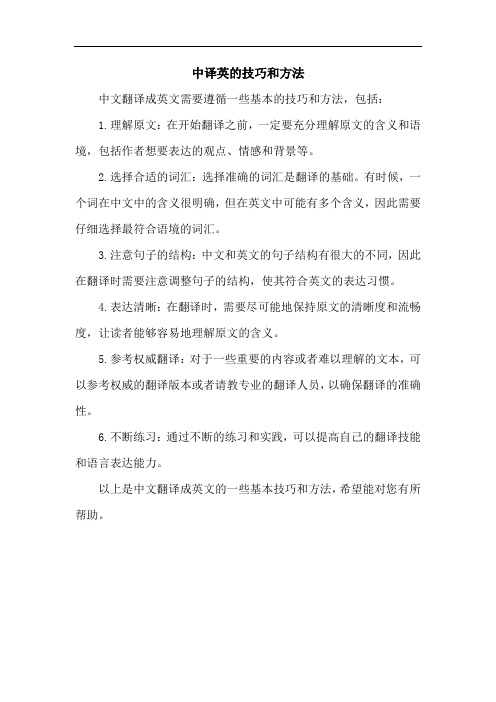
中译英的技巧和方法
中文翻译成英文需要遵循一些基本的技巧和方法,包括:
1.理解原文:在开始翻译之前,一定要充分理解原文的含义和语境,包括作者想要表达的观点、情感和背景等。
2.选择合适的词汇:选择准确的词汇是翻译的基础。
有时候,一个词在中文中的含义很明确,但在英文中可能有多个含义,因此需要仔细选择最符合语境的词汇。
3.注意句子的结构:中文和英文的句子结构有很大的不同,因此在翻译时需要注意调整句子的结构,使其符合英文的表达习惯。
4.表达清晰:在翻译时,需要尽可能地保持原文的清晰度和流畅度,让读者能够容易地理解原文的含义。
5.参考权威翻译:对于一些重要的内容或者难以理解的文本,可以参考权威的翻译版本或者请教专业的翻译人员,以确保翻译的准确性。
6.不断练习:通过不断的练习和实践,可以提高自己的翻译技能和语言表达能力。
以上是中文翻译成英文的一些基本技巧和方法,希望能对您有所帮助。
翻硕翻译技巧七之汉译英中的四个问题
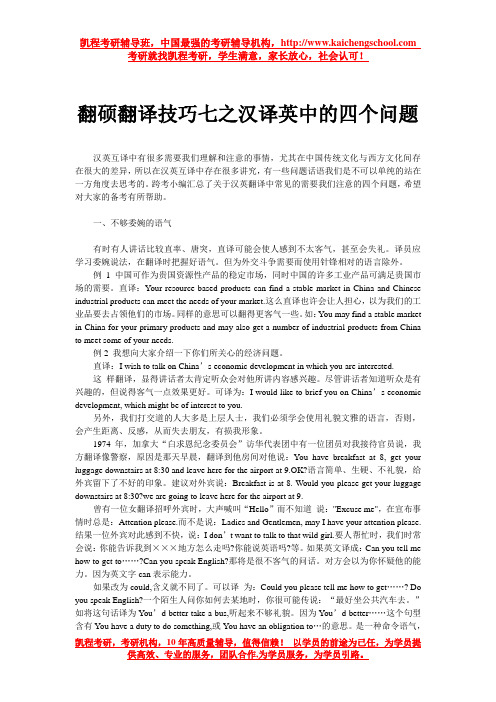
翻硕翻译技巧七之汉译英中的四个问题汉英互译中有很多需要我们理解和注意的事情,尤其在中国传统文化与西方文化间存在很大的差异,所以在汉英互译中存在很多讲究,有一些问题话语我们是不可以单纯的站在一方角度去思考的。
跨考小编汇总了关于汉英翻译中常见的需要我们注意的四个问题,希望对大家的备考有所帮助。
一、不够委婉的语气有时有人讲话比较直率、唐突,直译可能会使人感到不太客气,甚至会失礼。
译员应学习委婉说法,在翻译时把握好语气。
但为外交斗争需要而使用针锋相对的语言除外。
例1 中国可作为贵国资源性产品的稳定市场,同时中国的许多工业产品可满足贵国市场的需要。
直译:Your resource-based products can find a stable market in China and Chinese industrial products can meet the needs of your market.这么直译也许会让人担心,以为我们的工业品要去占领他们的市场。
同样的意思可以翻得更客气一些。
如:You may find a stable market in China for your primary products and may also get a number of industrial products from China to meet some of your needs.例2 我想向大家介绍一下你们所关心的经济问题。
直译:I wish to talk on China’s economic development in which you are interested.这样翻译,显得讲话者太肯定听众会对他所讲内容感兴趣。
尽管讲话者知道听众是有兴趣的,但说得客气一点效果更好。
可译为:I would like to brief you on China’s economic development, which might be of interest to you.另外,我们打交道的人大多是上层人士,我们必须学会使用礼貌文雅的语言,否则,会产生距离、反感,从而失去朋友,有损我形象。
汉译英的常用技巧

第二节 合 句 译 法 将下列句子译成英语,注意使用合句译法
(1)即使是最好的厨师,有时也会做出不好的菜来。 (2)门前放着一堆雨伞,少数也有十几把,五颜六色,大小 不一。 (3)在课堂上,他挥洒自如,海阔天空,旁征博引。 (4)听众听了他的演说,非常感动,全体表示支持这个建议。 (5)知道辜鸿铭这个名字的人,首先想到的,是他的那根在 民国以后的北平知识界里堪称独一无二的辫子。
第五节 补 全 译 法
将下列句子译成英语,注意使用补全译法。
(1)希望能够有越来越多的人学习汉语,了解中 国 文化。 (2)热烈欢迎各国游客参观故宫。 (3)在快速阅读中,主要应掌握全文的大意。 (4)估计班上大概会有80%的人通过期末考试。 (5)当前能源问题日益突出,直接影响到世界经 济 的稳定与繁荣。
第四节 换 序 译 法
译文
(1) Followed by a group of fans, the star finally came. (2) The purpose of the organization is to help those out of work reemployed. (3) It is necessary for everybody, especially the growing children and teenagers, to preserve their eyesight. (4) So kind were the teachers that the students shed tears when they graduated. (5) As early as 1649, Ohio made a decision that schools must be established in every town having 50 households or more.
汉译英翻译技巧

汉译英翻译技巧汉译英是翻译中的一个重要方向,也是一个相对来说较难的环节。
以下是一些汉译英的技巧,帮助你更好地翻译。
1. 理解上下文:在汉译英时,需要首先理解句子或段落所在的上下文,包括文化背景、语义关系等。
这样可以准确地翻译出作者的意图和观点。
避免字面翻译,要根据上下文合理转化。
2. 保持简洁:英语中通常使用简洁的表达方式,因此在翻译过程中要尽量减少冗余和重复的词语。
同时,要注意避免使用过于复杂的词汇和句子结构,保持句子简短,易于理解。
3. 注意动词时态:在汉译英中,需要根据上下文和句子的时态来选择合适的动词时态。
如果句子描述的是过去的事件或状态,应使用过去时;如果描述的是现在的事件或状态,应使用现在时;如果描述的是将来的事件或状态,应使用将来时。
4. 分清主谓宾关系:中文中主谓宾的顺序与英文中可能不同,所以要准确理解句子的主谓宾关系,正确表达出来。
主语通常出现在句子的开头,而宾语往往出现在动词之后。
5. 注意使用连词:英语中使用连词来连接不同的句子部分,以表达它们之间的逻辑关系。
因此,在汉译英时,要注意使用适当的连词,如and、but、or、however等,以确保句子之间的逻辑连贯。
6. 熟悉常用短语和惯用语:英语中有很多常用短语和惯用语,熟悉这些短语和惯用语能够使翻译更加自然和准确。
可以通过阅读英文书籍、新闻和文章来积累常用短语和惯用语。
7. 注意名词的单复数:英语中名词的单复数形式有很多规则,要注意根据上下文正确地使用单数或复数形式。
例如,当描述一般事实或抽象概念时,通常使用单数形式;当描述可数的事物时,使用复数形式。
8. 使用正确的词汇和词组:在翻译中,要选择准确的词汇和词组来表达原文的意思。
可以使用工具如在线词典或翻译软件来查找合适的词汇和词组。
9. 避免直译:汉译英时,要避免直译,尽量用英语习惯表达相同的意思。
直译通常会产生句子结构不通顺,语义混乱的问题。
要根据英语的表达习惯和习惯用法,选择合适的翻译方式。
- 1、下载文档前请自行甄别文档内容的完整性,平台不提供额外的编辑、内容补充、找答案等附加服务。
- 2、"仅部分预览"的文档,不可在线预览部分如存在完整性等问题,可反馈申请退款(可完整预览的文档不适用该条件!)。
- 3、如文档侵犯您的权益,请联系客服反馈,我们会尽快为您处理(人工客服工作时间:9:00-18:30)。
第五节 补 全 译 法 第六节 缩 句 译 法
第七节 转 态 译 法 第八节 正 反 译 法
第一节 断 句 译 法
• 练习题 将下列句子译成英语,注意使用断句译法
• (1)拿我们这些人来说,很多人每年都有一些进步。 • (2)耳朵是用来听声音的感官,鼻子用来闻气味,舌头用来尝滋味。 • (3)要想着美好的事情,要沉浸在过去的快乐中,并满怀感激之情。 • (4)要多花时间刷两侧和后面的牙,并从牙龈处刷起。 • (5)卓越不是一门技巧,而是一种态度。 • (6)关于能量,有这么一条基本的知识:相似频率的能量会互相吸
• (4)Spend more time on the teeth along the sides and in the back. Brush away from your gums.
• (5)Excellence is not a skill. It is an attitude. • (6)Here is a basic fact about energy. It is attracted to energy of a similar
driver was always accompanying him.
第一节 断 句 译 法
• 译文
• (10)Everyone loves beauty, and caring about one’s physical beauty is not wrong. However, there is always a limit. Those who go beyond the limit will miss the real essence of beauty.
• (11)China and Japan are close neighbors separated by just a strip of water. The relations between our two countries have a history of more than 1 000 years.
frequency. • (7)Tobacco is not only a human tragedy. Tobacco also burdens our health
system. • (8)Human beings cannot live without food. Hence they need farmers. • (9)A famous professor was often invited to lecture at various colleges. His
• (14)Carl was a quiet man. He didn’t talk much. He would always greet you with a big smile and a firm handshake.
• (15)Once in the woods, there were both deer and wolves. To protect the deer, people killed the wolves, taking it for granted that the deer were then saved. However it turned out to be just the opposite.
• (2)The ear is the organ that is used for hearing. The nose is used for smelling. The tongue is used for tasting.
• (3)Dwell on the good. Be consumed by past joys and obsessed with gratitude.
第二节 合 句 译 法
• 练习题/将下列句子译成英语,注意使用合句 译法
• (1)即使是最好的厨师,有时也会做出不好的菜来。 • (2)门前放着一堆雨伞,少数也有十几把,五颜六色,大小不一。 • (3)十年来,亚欧双方在相互尊重的基础上,开展了广泛多样的合
• (12)My daddy was my hero. He was always there for me when I needed him.
• 13)At first I was very excited. Then I thought I must be dreaming or maybe it was the wrong number.
• (15)森林里有鹿也有狼,人民为了保护鹿,就把狼消灭 了,认为这样就保护了鹿,哪知道适
• (1)Take for example those of us present here. Many of us make some progress each year.
Progressive Translation
翻译篇
第七章 汉译英的常用技巧
翻译技巧就是使译文忠实而地道的各种方法。本章拟介绍 以下八种翻译技巧:1.断句译法;2.合句译法;3.转句译 法;4.换序译法;5.补全译法;6.缩句译法;7.转态译法; 8.正反译法。
第一节 断 句 译 法 第二节 合 句 译 法
引。 • (7)烟草不仅给人类造成悲剧,而且还加重了我们卫生系统的负担。 • (8)人类没有食物不能生存,因此需要农民。 • (9)有一位知名的教授,经常应邀到各大学演讲,他的司机也总是
随行。
第一节 断 句 译 法
• (10)爱美之心人皆有之,注重外表美也并没有犯什么条 规,问题是凡事都要有度,超出尺度行事的人便好比买椟 还珠。
• (11)中日两国是近邻,一衣带水,我们两国的关系已经 有一千多年的历史。
• (12)我爸爸是我心目中的英雄,当我需要他的时候,他 总在我身边。
• (13)起初我非常兴奋,然后我想一定在做梦吧,或者他 们只是打错了电话。
• (14)卡尔寡言少语,他话不多,通常是用灿烂的微笑和 有力的握手和你打招呼。
